Chapter I _ Cinema - Art
Metaphors and archetypal symbols of the domestic space. Its recreation in the film Rear Window
Abstract
Working with the territory of the imaginary, which appears differentiated from the baggage of fictions that each viewer possesses, is to work at the level of archetypes.
Gilbert Durand inaugurated a new archetypal method of approaching the creative imagination according to which the territory of the imaginary appears differentiated from the baggage of fictions that each community possesses.
This IMAGINARY is defined as the set of mental and visual images through which the human being, individually or in society, organizes and symbolically expresses his relationship with the environment.
The motor that animates this symbolic system is the first contingency with which the individual finds himself, his own expiration, the death that a chronological or devouring time imposes on him.
This fear is embodied in the theriomorphic images that preside over two dynamic schemes, that of the threatening movement and that of the tearing bite, and the catamorphic images: the fall that instantly supposes the passage from the immortal condition of the being to its mortal condition, -the expulsion from the womb, from Paradise, the inauguration of chronological time, and the experience of death– and the darkness that produces the archetypal terror of darkness. These figures are opposed by light and standing up.
Starting from the basis that the real appears veiled before systems of symbolic approximation that remain behind everyday experience, this work analyzes the film Rear Window by Alfred Hitchcock in the light of the Imaginary exposed by Durand.
References

This work is licensed under a Creative Commons Attribution 4.0 International License.

